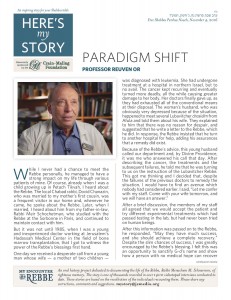Paradigm Shift
While I never had a chance to meet the Rebbe personally, he managed to have a strong impact on my life through various patients of mine. Of course, already when I was a child growing up in Petach Tikvah, I heard about the Rebbe. The local Chabad rabbi, Dovid Chanazin, who was married to my mother’s first cousin, was a frequent visitor in our home and, whenever he came, he spoke about the Rebbe. Later, when I married, I heard about him from my father-in-law, Rabbi Meir Schochetman, who studied with the Rebbe at the Sorbonne in Paris, and continued to maintain contact with him.
But it was not until 1985, when I was a young and inexperienced doctor working at Jerusalem’s Hadassah Medical Center in the field of bone marrow transplantation, that I got to witness the power of the Rebbe’s blessings first hand.
One day we received a desperate call from a young man whose wife – a mother of two children – was diagnosed with leukemia. She had undergone treatment at a hospital in northern Israel, but to no avail. The cancer kept recurring and eventually turned more deadly, all the while causing greater damage to her body. Her doctors finally gave up, as they had exhausted all of the conventional means at their disposal. The woman’s husband, who was obviously very depressed because of the situation, happened to meet several Lubavitcher chasidim from Afula and told them about his wife. They explained to him that there was no reason for despair, and suggested that he write a letter to the Rebbe, which he did. In response, the Rebbe insisted that he turn to another hospital for help, adding his assurances that a remedy did exist.
Because of the Rebbe’s advice, this young husband called our department and, by Divine Providence, it was me who answered his call that day. After describing the cancer, the treatments and the subsequent failures, he told me that he was turning to us on the instruction of the Lubavitcher Rebbe. This got me thinking and I decided that, despite the failures of the previous doctors to remedy the situation, I would have to find an avenue which nobody had considered earlier. I said, “Let me confer with my staff. Come with your wife tomorrow, and we will have an answer.”
After a brief discussion, the members of my staff all agreed that we would accept the patient and try different experimental treatments which had passed testing in the lab, but had never been tried on human beings.
After this information was passed on to the Rebbe, he responded, “May they have much success, and she should achieve a complete recovery.” Despite the slim chances of success, I was greatly encouraged by the Rebbe’s blessing. I felt this was an opportunity to sanctify G-d’s name and show how a person with no medical hope can recover with the help of a blessing.
We proceeded with the treatment and, to everyone’s surprise, after three or four weeks, we began to notice results. Also, her overall health began to improve little by little, and this allowed us to continue with our unorthodox methods and even to complete a successful bone marrow transplant. It was a very long and complicated process but, thank G-d, after six months of treatment, she was discharged from the hospital showing signs of full recovery.
There was immense relief and rejoicing, with everybody involved pronouncing this a miracle. What had begun as a hopeless condition had ended as a complete medical success. It was clear to all of us that G-d had a hand in this patient’s recovery. Today, she is a healthy, active grandmother, and I am still in touch with her family.
I learned from this case that under no circumstances may we ever lose hope. We must keep trying and searching for new ways and means – no matter how unconventional – until we succeed. Thus, the Rebbe’s blessing was a turning point in my medical career; it changed the way I treat patients, teach students and do medical research. I can say with confidence that the success that I have had in healing many patients since then is the result of the paradigm shift which the Rebbe inspired in me.
Some years later, the Rebbe taught me another lesson. A young man, the son of a prominent Israeli rabbi, was brought to my department with a bone marrow infection. We managed to cure the infection, but we feared that it would return. The medical staff was divided as how to proceed. One side felt that we should do a bone marrow transplant and, in this way, eradicate the threat completely. The other side felt that that the situation did not warrant placing the patient in so much danger, as a bone marrow transplant carries many risks. Neither side could persuade the other; even the experienced doctors could not agree which path posed a greater risk.
In the end, the family took the decision out of our hands and wrote to the Rebbe, who said that no transplant was necessary because the young man would be fine. As it turned out, he was right. This served as a reminder to me that doctors only serve as G-d’s instruments – an insight which has helped me over the course of my career. Many times I have faced situations in which my expertise was limited, and I felt at a loss as how to proceed. But upon remembering the Rebbe’s blessing, I have been reminded that I only need do my part for, in truth, the patient’s future is in G-d’s hands.
Professor Reuven Or is the director of the Bone Marrow Transplantation and Cancer Immunotherapy departments at Hadassah Medical Center. He was interviewed in Jerusalem in October of 2015.
This week’s Here’s My Story is generously sponsored:
לרפואה שלימה חולי לכל חולי ישראל
By Moshe and Miriam Fishman
Los Angeles, California





